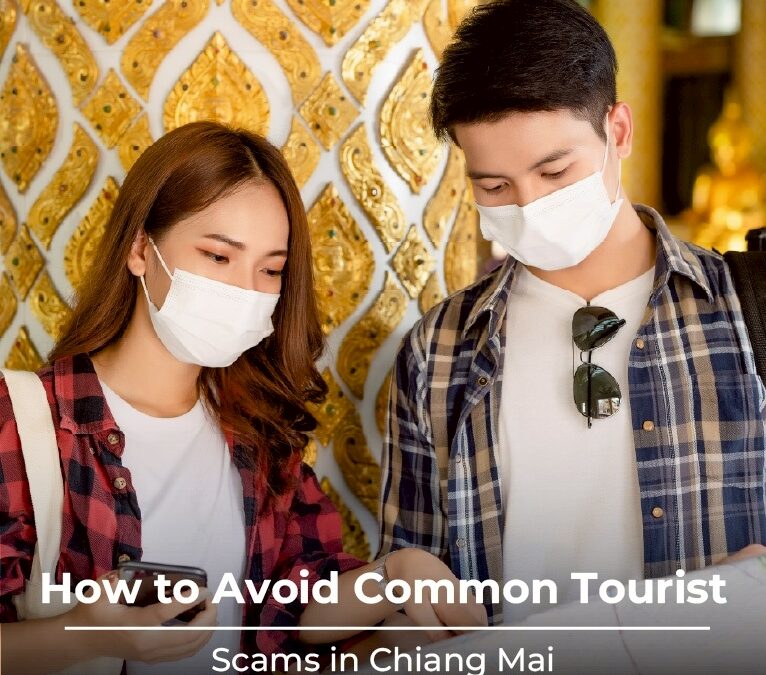Chiang Mai, a city rich in history, cultural heritage, and natural beauty, is a dream destination for both Thai and international travelers. Every year, millions of visitors come to experience the charm of Lanna, whether it’s paying respect at Wat Phra That Doi Suthep, strolling along the Sunday Walking Street, or trekking through the lush mountains.
Yet behind this warm and welcoming atmosphere, tourist scams still exist. The core message from DFS: While Chiang Mai is generally a safe city, there are hidden ways in which tourists may be exploited. With the right knowledge and awareness, you can fully enjoy your trip without worrying about being scammed.
Tuk-Tuk and Taxi Overcharging
Overcharging fares is not new in Thailand’s tourist cities, and Chiang Mai is no exception. Although the city is often considered more “friendly” than Bangkok, taking a tuk-tuk or taxi still comes with risks—especially on routes commonly used by foreigners, such as the airport to the city center.
Some tourists have reported being quoted 500–600 THB for a trip that should only cost around 200–250 THB.
How locals handle it
- Many locals prefer using Grab or Bolt, which offer clear, transparent pricing.
- If using a tuk-tuk, always ask the price first and negotiate politely.
- Use the Airport Taxi Counter, which provides standardized rates for everyone.
Trekking Tour Scams
Chiang Mai is famous for trekking tours and visiting hill tribe villages—key attractions for adventure seekers. However, because of high competition, some tour companies engage in false advertising. They promise an authentic experience but instead deliver staged performances or shopping traps.
Common scams include:
- Tours advertised as “full-day” but offering only a few hours of trekking.
- Visits to overcrowded tourist spots instead of pristine nature.
- Unexpected extra charges for food or equipment.
Tips to avoid scams:
- Check if the company has a TAT license.
- Choose agencies with strong positive reviews on TripAdvisor or Google Maps.
- Locals often recommend long-established tour operators over newer “cheap” ones.
Gem Shops และ Jewelry Scam
While Bangkok is notorious for the Gem Scam, some Chiang Mai jewelry shops also use similar tactics—selling items at inflated prices, claiming they are rare, genuine, or good investments, when in reality they may be of low quality.
These scams often happen when tuk-tuks or taxis take tourists to commission-based shops.
Prevention tips:
- Don’t buy expensive items from shops you just stumbled upon.
- Look for certificates from a reliable Gemological Institute.
- Buy only from long-established shops, such as those in the Night Bazaar.
Motorbike Rental Scams
Exploring Chiang Mai by motorbike is popular, but rental scams are common. Tourists are sometimes accused of causing pre-existing damage, then charged inflated repair fees.
Some have been asked to pay 5,000–10,000 THB, even when real damages would cost less than 500 THB.
Advice:
- Take photos and videos of the motorbike before renting.
- Avoid leaving your passport as collateral—use a copy instead.
- Rent only from shops with good reviews on Google and Facebook.
Soft Scams at Markets and Walking Streets
Warorot Market, Sunday Walking Street, and the Night Bazaar are shopping havens, but soft scams are common. Vendors may inflate prices, especially for foreigners unfamiliar with local pricing.
How to avoid overpaying
- Compare prices across different stalls.
- Bargaining for 10–30% off is common practice.
- Carry small bills to avoid “wrong change” or being forced into “change in goods.”
If you want a guaranteed fair and transparent experience, try Dolphin Spa Chiang Mai, offering a wide range of massage services.
Temple Donation Scam
Famous temples such as Wat Phra That Doi Suthep or Wat Chedi Luang attract thousands of visitors. Unfortunately, some impostors pose as monks or temple staff to solicit fake donations.
Signs to watch out for
- Genuine monks and temple staff do not directly ask for donations.
- Donate only through official temple donation boxes.
- If approached outside temple grounds, politely refuse.
Unsafe Adventure & Outdoor Activities
Chiang Mai is a hub for adventure tourism—ziplining, elephant rides, white-water rafting. Some operators lure tourists with cheap prices but cut corners on safety—using poorly maintained equipment or lacking proper insurance.
Safety tips:
- Ensure the company has a valid adventure tourism license.
- Prioritize operators with strong reviews for safety, not just low prices.
- Avoid providers who pressure you to buy “extra packages” mid-activity.
Conclusion
Chiang Mai remains an enchanting city, full of culture and natural wonders. But safe travel requires awareness and preparation.
By being informed about scams—from overpriced tuk-tuks to staged tours, rental fraud, fake donations, and unsafe adventures—you can save money and protect your trip.
Travel is not just about reaching a destination, but about returning home with great memories. If you stay alert, plan wisely, and choose trusted services, Chiang Mai will surely be a place you’ll want to revisit again and again.






